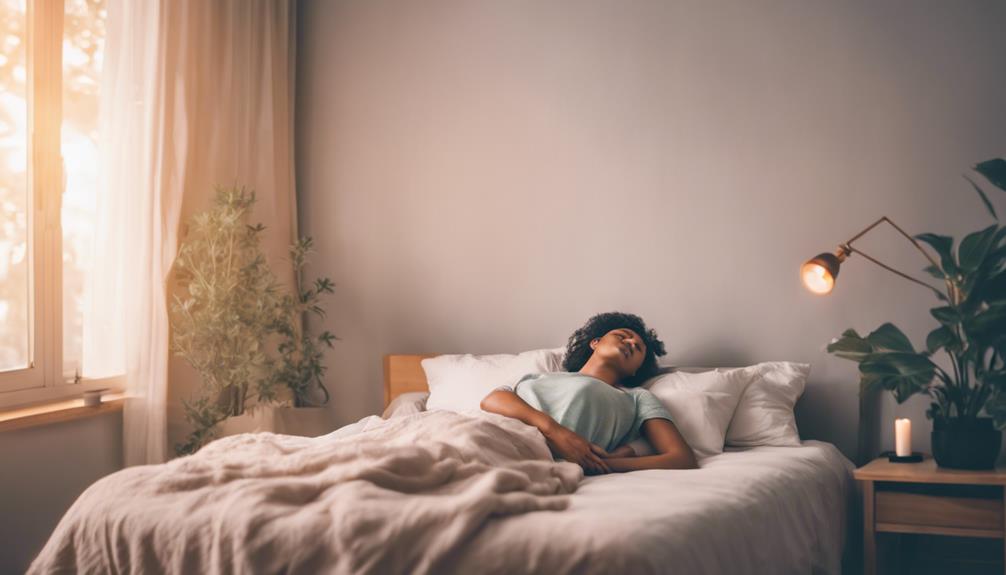Harness the profound power of health hypnosis to enhance your sleep quality. By delving into the subconscious mind, health hypnosis can address root causes of sleep disorders, promote deep relaxation, and target negative thought patterns. This holistic approach aids in managing insomnia, improving sleep hygiene, and supporting optimal brainwave activity. Research has shown improvements in sleep duration and quality, making hypnosis a promising alternative therapy. The benefits extend beyond just improving sleep quality.
Health Hypnosis Overview

By delving into the realm of the subconscious mind, health hypnosis offers a unique approach to addressing various health and wellness concerns. When it comes to sleep therapy, hypnosis benefits individuals by tapping into their subconscious thoughts and behaviors that may be hindering their ability to achieve restful sleep.
Health hypnosis can help individuals suffering from insomnia, night terrors, or other sleep disorders by promoting relaxation, reducing anxiety, and improving overall sleep quality.
One of the key advantages of using health hypnosis for sleep therapy is its ability to target the root cause of sleep disturbances, which are often deeply rooted in the subconscious mind. Through guided hypnosis sessions, individuals can explore and address underlying issues that may be contributing to their sleep problems, such as stress, trauma, or negative thought patterns.
Understanding Sleep Patterns
Understanding sleep patterns is essential for optimizing restorative sleep and overall well-being. Sleep patterns are typically divided into different stages, each serving a unique purpose in the body's rejuvenation process.
The sleep stages include non-rapid eye movement (NREM) sleep and rapid eye movement (REM) sleep. NREM sleep is further divided into three stages, with each stage playing a crucial role in physical restoration, immune function, and memory consolidation. On the other hand, REM sleep is vital for cognitive processes, emotional regulation, and overall mental health.
Moreover, our sleep patterns are deeply intertwined with our circadian rhythm, which acts as the body's internal clock regulating the sleep-wake cycle. Disruption to this natural rhythm, such as irregular sleep schedules or exposure to artificial light at night, can lead to difficulties in falling asleep and maintaining restful sleep.
Impact on Sleep Disorders

Research shows a significant impact on sleep disorders when considering the influence of various factors on individuals' ability to achieve restful and rejuvenating sleep. Insomnia management is a crucial aspect of addressing sleep disorders, and health hypnosis has emerged as a promising tool in this area. Sleep therapy utilizing hypnosis techniques can help individuals struggling with insomnia by promoting relaxation, reducing anxiety, and rewiring negative thought patterns that contribute to sleep difficulties.
In addition to insomnia management, focusing on sleep hygiene is essential in improving sleep quality. Health hypnosis can assist individuals in developing healthy bedtime routines, creating a sleep-conducive environment, and establishing regular sleep schedules, all of which are vital components of good sleep hygiene.
Moreover, incorporating relaxation techniques such as guided imagery, progressive muscle relaxation, and deep breathing exercises through hypnosis can further enhance the effectiveness of sleep therapy in addressing sleep disorders.
Brainwave Activity and Sleep
An examination of brainwave activity during sleep reveals crucial insights into the mechanisms underlying the sleep cycle and its impact on overall health and well-being. Brainwave patterns play a significant role in determining the different sleep stages individuals experience throughout the night.
During the initial stages of sleep, known as non-REM (rapid eye movement) sleep, brainwave patterns slow down as the body transitions from wakefulness to deeper sleep. This stage is crucial for physical restoration and growth.
As sleep progresses, individuals enter REM sleep, characterized by rapid and random eye movements, vivid dreaming, and increased brain activity. REM sleep is essential for cognitive functioning and emotional regulation.
Understanding brainwave activity during sleep is vital for diagnosing and treating sleep disorders such as insomnia or sleep apnea. By monitoring brainwave patterns, healthcare professionals can identify abnormalities in sleep stages and tailor interventions to improve sleep quality and overall well-being.
Promoting healthy brainwave activity during sleep is fundamental for achieving restorative rest and optimal health.
Reducing Stress and Anxiety

Exploring effective strategies for managing stress and anxiety is essential for promoting mental well-being and overall health. Stress management plays a crucial role in improving sleep quality and overall health.
One effective approach is the use of relaxation techniques, such as deep breathing exercises, progressive muscle relaxation, and mindfulness meditation. These techniques help lower stress levels, reduce anxiety, and promote a sense of calmness, which can positively impact sleep quality.
Engaging in physical activity, maintaining a healthy diet, and ensuring adequate sleep hygiene are also important factors in managing stress and anxiety. Regular exercise releases endorphins, which are natural mood lifters, while a balanced diet provides essential nutrients that support mental health.
Additionally, establishing a consistent sleep routine, avoiding stimulants close to bedtime, and creating a comfortable sleep environment can contribute to reducing stress levels and improving overall sleep quality.
Improving Sleep Duration
How can individuals enhance their sleep duration to optimize their physical and mental well-being? Achieving adequate sleep duration is crucial for overall health. To improve sleep duration, focusing on good sleep hygiene practices and creating a conducive sleep environment are essential.
Sleep hygiene involves establishing a bedtime routine, maintaining a consistent sleep schedule, avoiding stimulants like caffeine close to bedtime, and creating a calming pre-sleep routine. These practices signal to the body that it is time to wind down and prepare for rest, facilitating longer and more restful sleep.
Additionally, optimizing the sleep environment can significantly impact sleep duration. Ensuring the bedroom is dark, quiet, and at a comfortable temperature promotes uninterrupted sleep. Investing in a comfortable mattress and pillows, as well as minimizing distractions such as electronic devices, can further enhance the sleep environment.
Enhancing Sleep Quality

Understanding the factors that contribute to sleep quality is essential for promoting restorative and rejuvenating sleep. Two key components that play a crucial role in enhancing sleep quality are sleep hygiene and relaxation techniques.
Sleep hygiene refers to a set of practices and habits that promote healthy sleep. This includes maintaining a consistent sleep schedule, creating a relaxing bedtime routine, ensuring a comfortable sleep environment, limiting exposure to screens before bed, and avoiding stimulants like caffeine close to bedtime. By following good sleep hygiene practices, individuals can improve the quality of their sleep and wake up feeling more refreshed and alert.
In addition to sleep hygiene, incorporating relaxation techniques into a bedtime routine can further enhance sleep quality. Techniques such as deep breathing exercises, progressive muscle relaxation, meditation, and guided imagery can help calm the mind and body, reducing stress and promoting a sense of relaxation conducive to falling asleep and staying asleep throughout the night.
Research Findings and Evidence
Recent research findings have provided valuable evidence supporting the effectiveness of health hypnosis in improving sleep quality. Clinical studies have shown that hypnosis can be a powerful tool in addressing sleep issues by promoting relaxation and enhancing sleep hygiene. By incorporating relaxation techniques such as guided imagery and deep breathing exercises, hypnosis helps individuals achieve a state of deep relaxation, making it easier for them to fall asleep and stay asleep throughout the night.
One study published in the Journal of Clinical Sleep Medicine found that participants who underwent hypnosis experienced significant improvements in sleep duration and quality compared to those who did not receive hypnotherapy. These results highlight the potential of hypnosis as a complementary approach to traditional sleep interventions.
Moreover, research has indicated that hypnosis can also be beneficial for managing underlying factors contributing to sleep disturbances, such as anxiety and stress. By targeting these root causes, hypnosis offers a holistic approach to improving sleep that goes beyond just addressing the symptoms.
As more studies continue to explore the link between hypnosis effectiveness and sleep quality, it is becoming increasingly clear that this alternative therapy holds promise in promoting better sleep outcomes for individuals struggling with insomnia and other sleep disorders.
Frequently Asked Questions
Can Health Hypnosis Be Used for Children With Sleep Issues?
Health hypnosis can be beneficial for children with sleep issues, especially when related to child anxiety. Parent involvement is crucial in the process to ensure support and continuity of care. Research supports the efficacy of hypnosis in addressing sleep problems in children.
Are There Any Potential Side Effects of Using Health Hypnosis for Sleep?
When considering health hypnosis for sleep, it's essential to weigh potential risks and benefits. While generally safe and effective, some individuals may experience temporary dizziness or confusion. Consulting a qualified practitioner can mitigate these concerns.
How Long Does It Take to See Results From Health Hypnosis?
The timeline for observing results from health hypnosis on sleep patterns varies among individuals due to factors like patient expectations, session frequency, and the nature of the sleep issue. Consistent practice and open communication with the therapist are key.
Can Health Hypnosis Be Used Alongside Other Sleep Treatments?
Combining treatments for sleep disorders is a common practice, and health hypnosis can be used alongside other sleep treatments. Alternative therapies like hypnosis may complement conventional interventions, offering a holistic approach to improving sleep quality.
Is Health Hypnosis Effective for Chronic Insomnia Sufferers?
Alternative therapies like health hypnosis can be effective for chronic insomnia sufferers by addressing mental health aspects contributing to sleep disturbances. Research suggests hypnosis may improve sleep quality, offering a promising option.
Conclusion
In conclusion, health hypnosis has been shown to be an effective tool for improving sleep quality by reducing stress and anxiety, enhancing sleep duration, and promoting better sleep patterns.
Research findings have provided evidence of the positive impact of health hypnosis on brainwave activity during sleep, leading to improved overall sleep quality.
Incorporating health hypnosis into a comprehensive sleep health plan may offer individuals a natural and holistic approach to achieving better sleep.
